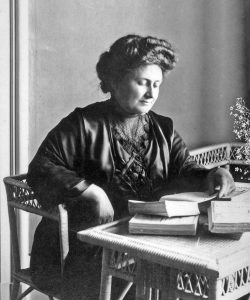Montessori Education
 Maria Montessori
Maria Montessori
Considered one of the world’s great educators, physicians, scientists, and psychologist, Dr. Maria Montessori opened her first school in Rome in 1907 and revolutionized education thinking by recognizing the vast learning abilities of young children. The Montessori classroom is an exciting place. It is an enriched learning environment in which your child is free to act and develop, within a disciplined structure, guided by their inner direction.
Peace Education is a fundamental component underpinning Maria Montessori’s avant- garde approach, and it continues to inspire hope in humanity today. At Montessori Academy of Lancaster, we aim to instill the values of peace education by modeling mutual respect, showing empathy, practicing conflict resolution strategies, and celebrating cultural differences in an inclusive and supportive community.
“The child.... desperately wants to develop his resources, his ability to cope with a strange, complex world. He wants to do and see and learn for himself, through his senses and not through the eyes of an adult. The child who accomplishes this moves into harmony with his world. He becomes a full person. He is educated."
-Maria Montessori
An Environment for Learning
In our classrooms there are hundreds of unique, self-teaching materials which are handled by the children according to their ability level. While instructing, these items help develop attention to detail, organizations, independence, self-confidence, and problem solving. It is not Montessori's goal to teach “correct usage" but to provide stimuli that captures your child’s attention and initiates focus.
Our materials help your child develop self-reliance, muscle control, and sequencing while caring for self and the environment. Equipment teachers tying, buttoning, polishing, washing, scrubbing transferring, pouring table-setting, food preparations and serving, sorting, sewing, and other life skills.
The goal of sensorial materials is to train your child to observe, make comparisons between objects, form judgements, reason, and decide. All materials are handcrafted and of a quality worthy of respect. Exercises help heighten the awareness of your child’s senses to sound, touch, smell, weight, sight, and taste.
Intellectual materials are not designed to communicate facts, but to cultivate your child’s desire to learn. Geography, history, science, art, reading, languages, and mathematics are presented. Here a base is formed from which research and inquiry can continue as your child matures.
Our school has a special early childhood program to nurture the natural development of children eighteen months to five years old. The program provides multisensory stimuli to excite their natural curiosity and love for knowledge. Our teachers seek to see the infinite creativity and capability of each student as they grow, develop, and form positive social connections. You will find our youngest students engaged in practical life tasks, hands-on activities, creative & artistic expression, cultural experiences, and much more. Our early childhood curriculum allows students to experience learning as natural, guided, and open to exploration.
The elementary program presents advanced learning stimuli. Children from six to twelve years choose teacher-approved activities and receive lessons suited to their needs at a particular time. Order is provided by a structure of progressively challenging learning tasks which concentrate on language arts and math skills, and incorporate cultural subjects such as history, geography, and science. Read more ........(drop down to include below)
Cultural studies are part of Maria Montessori’s vision of Cosmic Education, giving children a “big picture" view of the universe. Montessori’s five Great Lessons are introduced at the beginning of each year and aim to spark students’ curiosity and interest. We value integrating the arts into all subject areas and aspire to grow creative expression, a love of learning, and critical thinking skills for all students during the elementary years and beyond.
Every child experiences planes of development which guide physical and mental growth. During these “sensitive periods" your child demonstrates intense interest in certain sensorial and abstract experiences. The Montessori teacher is your child’s guide, observer, and maintainer of order. Our teachers prepare the environment by introducing and demonstrating materials, removing obstructions to learning, encouraging your child to experience and overcome obstacles, and redirecting interest, when necessary. We have many teachers with Montessori training specific to the age group they are guiding, and each classroom has at least one state certified teacher.
Freedom is a goal, not a starting point. The environment allows your child to experience order and discipline in the Montessori classroom. Eventually, these qualities flower from within rather than being imposed on by others. We seek to develop within your child a respect for self and others, recognition and acceptance of responsibility for personal actions and outcomes, independence while caring for the welfare of others, and inner discipline for self-control.
The Montessori Academy of Lancaster welcomes children from 18 months to twelve years of age. Since children are treated individually in an ungraded setting, stimulation and interest are offered at your child’s own level –not according to a predetermined group. Returning students bring prior experience and can help to assimilate new children to the Academy. Remedial speech and language services are provided by Lancaster-Lebanon Intermediate Unit 13 to eligible students in the Kindergarten and Elementary program. Guidance and psychological services are also offered by the IU-13.
Sequential programs parallel 3-year developmental cycles. Your child begins by observing and exploring the world. Soon, concepts begin to crystallize and are eventually converted into higher forms of thinking through abstractions. These learning skills prepare children to succeed as they move into other educational systems.
The books, websites, and videos listed below are just a few of the many resources published about the Montessori method. We recommend perusing to help gain a deeper understanding of Maria Montessori’s approach to education.
- About Montessori Education - a great place to start!
- Introduction Montessori's Planes of Develoment
- Inside the Montessori Classroom
- The Montessori Notebook
- The Absorbent Mind by Maria Montessori
- The Science Behind the Genius by Angeline Stoll Lillard
- More books about Montessori for parents and children
“I hear and I forget, I see, and I remember, I do, and I understand."
-Montessori student
Related Links
Fast Facts
- Montessori program for children ages 18 months through grade six
- Mon-Fri full day and half day programs, 8:45 am - 3:30 pm program dependent
- Before and after care options and after school clubs are available
- Teacher:Student ratios: 1:6 in toddler, 1:12 in multi-age classrooms
- 10-acre nature-inspired school property
- Established in 1982 by Montessori trained parents
- Inclusive school community embracing peace education
